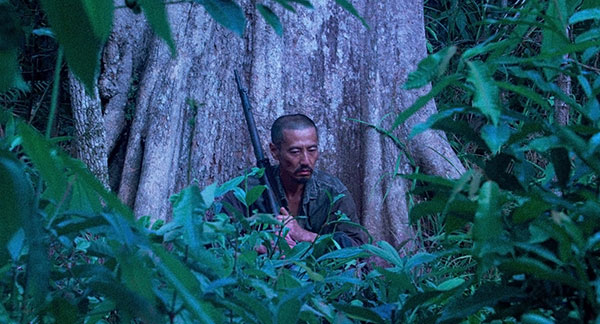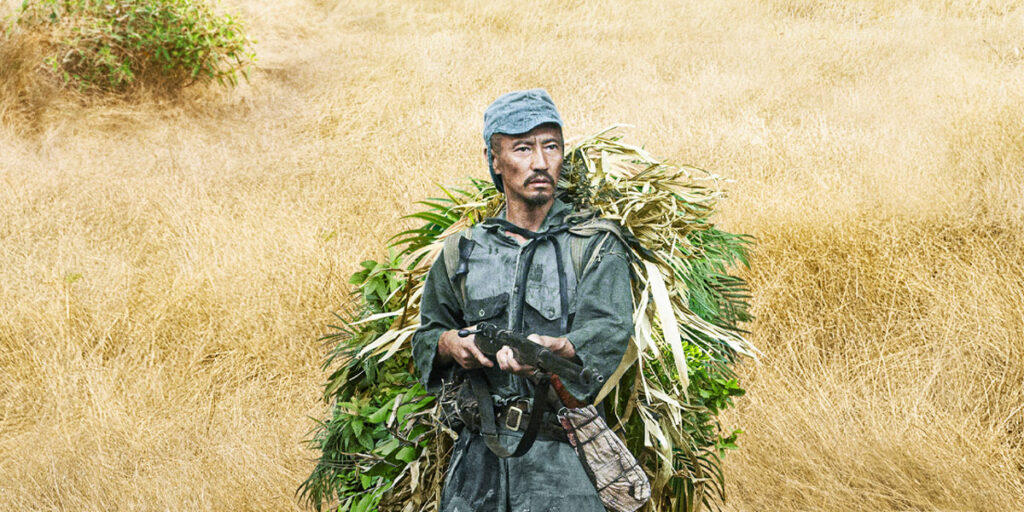The highly immersive Onoda: 10000 Nights in the Jungle depicts the fascinating story of a soldier for whom World War Two ended decades after 1945.
In a time when war films are common, it takes a lot for one to stand out. Arthur Harari’s (Dark Diamond) patient and evocative Onoda: 10000 Nights in the Jungle is one such film, a rare beast that lacks the bombast of other recent depictions of war, such as Netflix’s remake of All Quiet on the Western Front (2022), but has all the complexity, nuance and intelligence which that film lacks. Inspired by the influential Japanese director Kenji Mizoguchi (Ugetsu, Sansho the Bailiff) and taking freedom in his depiction of Hiroo Onoda, Harari concocts a film that is both epic and intimate, violent and beautiful, and whilst its occasional neutrality comes across as frustrating, Onoda forms into a complex, intriguing treatise on war, honour, and nationalism.
Onoda: 10000 Nights in the Jungle follows the real-life soldier of the same name, who at 22 years old was trained for intelligence work to aid Japan in World War Two. This secret training contained one marked difference to what other soldiers were told: avoid death at all costs, with suicide forbidden. Onoda, an impressionable young man driven by the demands of both his father and his commanding officer, finds himself on Lubang, an island in the Philippines. An American landing is imminent, as is the end of the war, although this part is either not known or overlooked by Onoda and his fellow soldiers. Eventually, he is left with four others, a group which diminishes over time, with Onoda remaining as the last soldier on Lubang right up until 1974.

Harari maintains a wonderful intrigue throughout Onoda. His film is inspired by Gérard Chenu and Bernard Cendron’s 1974 biography, “Onoda, seul en guerre dans la jungle”, and isn’t based on Onoda’s own memoirs, which adds to the mystery of this soldier’s story and the unfathomability of what he went through. Endō Yūya (The House Where the Mermaid Sleeps) and Tsuda Kanji (Hana-Bi) as the young and old Onoda respectively bring a stoic silence to the titular character, reflective of his unwavering commitment to a cause forgotten by most, and both actors show glimpses of Onoda’s personality without ever fully revealing his inner workings. Despite its near 3-hour runtime, Onoda doesn’t give enough background to his early years, swiftly dropping him into war as a 22-year-old, which can sometimes muddy his motives and lessen the depth of his character.
Tom Harari’s (I Have Loved Living Here) sublime cinematography enhances these enigmatic qualities. The jungle of Lubang morphs into a time machine, a home of 30 years or 10000 days that simmers with nostalgia. Whether it is a Lucky Strike cigarette packet floating slowly in a river, wartime music whispering through the trees, or makeshift graves scattered throughout its trees and fields, the surroundings are entrenched with history. A patient pacing from Arthur Harari allows this beguiling story to form intricately, piece by piece, as it depicts a man of great complexity weighed down by notions of nationalism and honour.
Like Masaki Kobayashi’s Harakiri (1962), which ferociously belittles and questions those in power, Onoda: 10000 Nights in the Jungle calls out of the absurdity of honour and authority. It never attacks it quite as fervently as Kobayashi’s unrivalled masterpiece, but Harari’s film still has a questioning anger behind it. Both its length and pace cause these complex channels to dwindle in effect, and sometimes it isn’t clear what Harari’s message really is, but Onoda remains a very effective portrait of a war, soldier unit, and country in disintegration. Its slow tempo and 167-minute runtime are, whilst testing, necessary in mirroring Onoda’s long and arduous journey of dedication.
Harari admirably never offers easy answers as to what the viewer should think of Onoda: on the one hand, he was a young man drilled with doctrines and forgotten by his country, driven to obsession by nationalism and unrelenting honour; on the other, deplorable actions along his journey dirty his character. Like Kazuo Hara’s The Emperor’s Naked Army Marches On (1987) – a documentary which similarly depicts a struggling Japanese war veteran in the years after World War Two – Onoda: 10000 Nights in the Jungle has a firm focus on the damage war can do to a soldier, whatever nation they fight for. It captures the complex workings and psyche of these men, and on the whole remains an unsettling and immersive journey into the heart of darkness, not too dissimilar to that of Apocalypse Now (1979).
Onoda: 10000 Nights in the Jungle will be released on all major VOD platforms from December 13, 2022.

